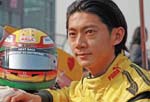View
Disasters can make friends of enemies
Updated: 2011-03-29 07:54
By Sandra Lee (China Daily)
In 1957 I arrived in Japan as a young bride. On the trip to the military base my husband tried to shield my eyes.
 |
He didn't want me to have an image of the undeveloped country as my first impression. Roads were rudimentary and some people were dressed in rags. Stray dogs pulled at garbage. Sewage ran down both sides of roads in ditches, where people washed clothes and vegetables. A stench permeated the air. Traffic rules seemed nonexistent as everyone simply steered vehicles where they wanted to go with no regard for others. There were no barriers at railroad crossings and horrible accidents were numerous. Buses were made into "restroom" stops where the women relieved themselves at the back and the men in the front.
In the nearly four years I lived there, the changes were astounding. Roads were widened and paved, we all talked about the first service station that had a restroom with running water! Slums were torn down and shiny buildings in modern styles began to appear. In the countryside many more families had electricity and running water. Traffic laws began to be enforced and new hospitals and schools sprung up. Tokyo transformed itself from a firebombed ruin to a sleek new city with an amazing, new infrastructure of airports, highways and efficient trains and subways.
The reason was the Summer Olympics of 1964. Japan wanted to show the world that it was a peaceful, beautiful, clean, well-run city.
New technologies were introduced at the Games that signaled their soon-to-be dominant quality products, requiring advanced technology.
Rarely does life repeat itself, but living in China when the 2008 Summer Olympics were awarded to China was dj vu. I've watched this country transform itself for many of the same reasons. To show the world the old days are over and modernization and improved living standards to increasing numbers of citizens have become the norm.
In both cases, the Games served notice that the country was amply prepared to be a peaceful, world-class player, capable of cutting-edge technology.
In China, in 2008, the Sichuan earthquake was a devastating event, which drew the sympathy of the whole world as people rushed to give aid.
 |
During the Sichuan earthquake, Japan was a first responder, supplying many kinds of support. Now China is a first responder to Japan's terrible crises. Both countries share historic DNA and, in modern times, mutual interests and an obvious willingness to reach out to each other in times of need.
The loss and sadness inherent in natural disasters is unmistakable. What is sometimes less obvious is how, in times of celebration we applaud each other's successes, but, more importantly, in times of sorrow, old enmities can be forgotten in the urgency of human beings reaching out to human beings. Natural disasters know no borders nor do they know about historic wounds. They strike at nature's will and we are all at their mercy.
I am deeply moved and grateful to have part of my personal history entwined with these two great countries. They have both, in my lifetime, shown the world glory through the Olympics and their greatness of heart and the will to survive through unspeakable disasters. That they reach out to each other in compassion and humanity shows that the human spirit prefers to create a harmonious world. Together.
Specials

Share your China stories!
Foreign readers are invited to share your China stories.

Art auctions
China accounted for 33% of global fine art sales.

Waiting for drivers' seat
Lack of sponsorship appears to be why Chinese drivers have yet to race in a Formula 1 event